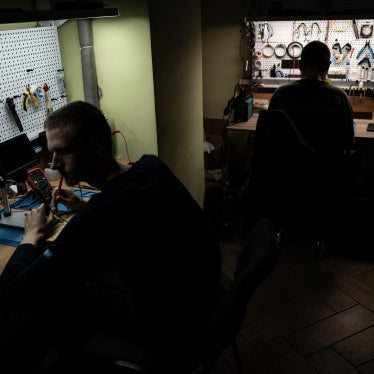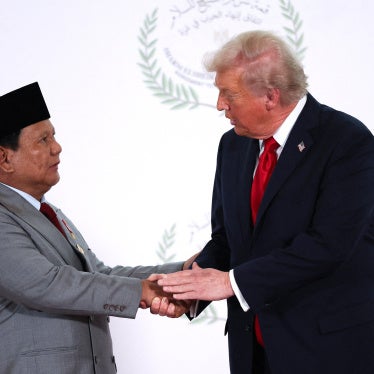(New York) - Saudi Arabia's Bureau of Investigation and Public Prosecutions should immediately drop "cybercrimes" charges against Nasir al-Subai'i for writing about his bureaucratic ordeal as he tried to get the government to pay for his brother's medical care, Human Rights Watch said today.
In early 2009, al-Subai'i began blogging and speaking to the media about the lack of support he contends he received from Saudi officials as he tried to arrange care for his brother, Muhammad al-Subai'i, who had been in a coma after a traffic accident in Saudi Arabia in March 2007.
"Saudi prosecutors are trying to silence legitimate complaints, which Saudi citizens have the right to make public," said Sarah Leah Whitson, Middle East director at Human Rights Watch. "Public criticism of the government's alleged failures are an important check on its performance and a good tool for accountability."
Al-Subai'i claims Saudi officials in the Foreign Affairs and Health Ministries never implemented King Abdullah's orders to cover expenses for his brother's treatment in China, and to facilitate further treatment in the United States.
After Muhammad had been in a Saudi hospital for five months, al-Subai'i took him to China on October 5, 2007, for a specialized procedure at Beijing's Naval Hospital. From there, he sent a petition to the Saudi Royal Court, the administration directly under the king, applying for reimbursement of his brother's medical and travel expenses. Documents show that the Saudi embassy in Beijing transmitted al-Subai'i's request via the foreign affairs ministry in Riyadh and that there was initial approval to pay the expenses. But the payment was never made, nor was further treatment he requested for his brother approved.
Saudi Arabia funds necessary medical treatment for its citizens abroad if such treatment is unavailable in the kingdom. Many Saudi embassies have medical administrators on staff to facilitate medical arrangements, and occasionally provide services like transportation and per diems. According to a document provided to Human Rights Watch, King Abdullah, on November 21, 2007, approved paying for Muhammad al-Subai'i's treatment in Beijing and instructed the health minister to process payment. Responding to the king's instructions, the general manager for medical establishments and offices abroad under the Ministry of Health, Dr. Fahd bin Sulaiman al-Sudairi, ten days later requested detailed medical reports and expenses for Muhammad's treatment from the Saudi embassy in Beijing, another document Human Rights Watch obtained shows.
The Subai'is left Beijing for Saudi Arabia on January 7, 2008, without reimbursement for their expenses. The consul has told Human Rights Watch that he dutifully facilitated al-Subai'i's request, but that the matter had remained in the hands of the Ministry of Health without a decision. Al-Subai'i denies that the consul informed him about the initial consent of the Royal Court.
After returning from China, Nasir al-Subai'i sought further treatment options for his brother at London's Wellington hospital and the Rehabilitation Institute of Chicago, both of which provided letters of acceptance, dated November 12, 2008 and April 20, 2009 respectively. According to another document provided to Human Rights Watch, on February 27, 2008, King Abdullah agreed that the state cover Muhammad's medical expenses for rehabilitation in the United States, but the Health Ministry never approved this treatment, al-Subai'i says. His brother remains in a Saudi hospital bed, receiving only nursing, but not specialized rehabilitative care.
Disappointed at what he perceived to be a lack of cooperation by some Saudi officials, on November 16, 2008, al-Subai'i filed a legal case against the Ministry of Health and Consul al-Shammari, seeking payment for Muhammad's treatment in China, and payment and facilitation of treatment in the US. The Board of Grievances, Saudi Arabia's administrative court, accepted only the part of the case against the Health Ministry, and only the part that sought future treatment in the US. The case is ongoing. Al-Suba'i subsequently created a blog, posted YouTube videos, and appeared on television shows of the Lebanese Broadcasting Corporation, and of Saudi Arabia's al-Iqtisadiya television, among others, decrying his failed attempts to have the state cover his brother's medical expenses in China and to provide further treatment in the United States. In particular, he criticized what he said was the lack of support from the Saudi consul in Beijing. Between March and May 2009, al-Subai'i had also sent complaints to the foreign affairs and interior ministries, as well as to the Royal Court.
Prosecutors at the Bureau of Investigation and Public Prosecutions in Khafji on the border with Kuwait summoned al-Subai'i in late July 2009 and told him to sign a pledge saying he would not post anything further about the matter on the internet. Although he signed, prosecutors called him two weeks later, saying he now faced unspecified charges under the Law to Combat Information Crimes over allegedly libelous comments he made against the Saudi consul, Majid al-Shammari. He was released on bail.
Saudi Arabia in March 2007 issued the Law to Combat Information Crimes, under which al-Subai'i was charged, which aims to "protect the public interest and morals," (art. 2). The law punishes "libeling others ... by various means of information technology" with sentences of up to one year in prison and up to 500,000 Saudi Riyals in fine (about US$135,000) (art. 3.5.), and "producing anything that of its nature contests public order ... or the inviolability of private life" (art.6.1.) with up to five years in prison and a fine of up to three million Riyals. The use of this overbroad law, violates the internationally protected right to freedom of expression, given that it is used in cases such as this when someone is commenting on a matter of public administration, Human Rights Watch said.
The United Nations General Assembly in March 1999 adopted a resolution on the rights of human rights defenders, that protects the right "to draw public attention to [all human rights and fundamental freedoms]," (art. 6), and the right of "everyone whose rights or freedoms are allegedly violated ... to complain to and have that complaint promptly reviewed in a public hearing before an independent, impartial and competent judicial or other authority established by law" (art. 9.2.).
Specifically, the resolution recognizes the right "[t]o complain about ... actions of individual officials and governmental bodies with regard to violations of human rights and fundamental freedoms" (art.9.3.a.). Any limitations on these rights must be "solely for the purpose of securing due recognition and respect for the rights and freedoms of others ... in a democratic society" (art.17).
Human Rights Watch calls on Saudi Arabia to decriminalize all forms of peaceful expression, including abolishing the criminal charge of libel.
"The government has no business silencing exposure of alleged misdeeds by its officials by threatening to throw their critics in jail," Whitson said. "If anything, the state should tolerate a greater degree of criticism of public officials than ordinary citizens, without resorting to charges of criminal libel, which are so frequently used to silence critics."








